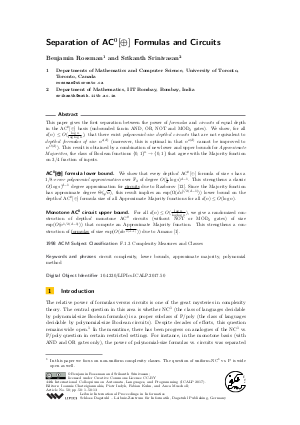Separation of AC^0[oplus] Formulas and Circuits
Authors Benjamin Rossman, Srikanth Srinivasan
-
Part of:
Volume:
44th International Colloquium on Automata, Languages, and Programming (ICALP 2017)
Part of: Series: Leibniz International Proceedings in Informatics (LIPIcs)
Part of: Conference: International Colloquium on Automata, Languages, and Programming (ICALP) - License:
 Creative Commons Attribution 3.0 Unported license
Creative Commons Attribution 3.0 Unported license
- Publication Date: 2017-07-07
File

PDF
LIPIcs.ICALP.2017.50.pdf
- Filesize: 0.51 MB
- 13 pages
Document Identifiers
Subject Classification
Keywords
- circuit complexity
- lower bounds
- approximate majority
- polynomial method
Metrics
- Access Statistics
-
Total Accesses (updated on a weekly basis)
0PDF Downloads0Metadata Views
Abstract
This paper gives the first separation between the power of formulas and circuits of equal depth in the AC^0[\oplus] basis (unbounded fan-in AND, OR, NOT and MOD_2 gates). We show, for all d(n) <= O(log n/log log n), that there exist polynomial-size depth-d circuits that are not equivalent to depth-d formulas of size n^{o(d)} (moreover, this is optimal in that n^{o(d)} cannot be improved to n^{O(d)}). This result is obtained by a combination of new lower and upper bounds for Approximate Majorities, the class of Boolean functions {0,1}^n to {0,1} that agree with the Majority function on 3/4 fraction of inputs.
AC^0[\oplus] formula lower bound.
We show that every depth-d AC^0[\oplus] formula of size s has a (1/8)-error polynomial approximation over F_2 of degree O((log s)/d)^{d-1}. This strengthens a classic $O(log s)^{d-1}$ degree approximation for circuits due to Razborov. Since the Majority function has approximate degree Theta(\sqrt n), this result implies an \exp(\Omega(dn^{1/2(d-1)})) lower bound on the depth-d AC^0[\oplus] formula size of all Approximate Majority functions for all d(n) <= O(log n).
Monotone AC^0 circuit upper bound.
For all d(n) <= O(log n/log log n), we give a randomized construction of depth-d monotone AC^0 circuits (without NOT or MOD_2 gates) of size \exp(O(n^{1/2(d-1)}))} that compute an Approximate Majority function. This strengthens a construction of formulas of size \exp(O(dn^{1/2(d-1)})) due to Amano.
Cite As Get BibTex
Benjamin Rossman and Srikanth Srinivasan. Separation of AC^0[oplus] Formulas and Circuits. In 44th International Colloquium on Automata, Languages, and Programming (ICALP 2017). Leibniz International Proceedings in Informatics (LIPIcs), Volume 80, pp. 50:1-50:13, Schloss Dagstuhl – Leibniz-Zentrum für Informatik (2017)
https://doi.org/10.4230/LIPIcs.ICALP.2017.50
BibTex
@InProceedings{rossman_et_al:LIPIcs.ICALP.2017.50,
author = {Rossman, Benjamin and Srinivasan, Srikanth},
title = {{Separation of AC^0\lbrackoplus\rbrack Formulas and Circuits}},
booktitle = {44th International Colloquium on Automata, Languages, and Programming (ICALP 2017)},
pages = {50:1--50:13},
series = {Leibniz International Proceedings in Informatics (LIPIcs)},
ISBN = {978-3-95977-041-5},
ISSN = {1868-8969},
year = {2017},
volume = {80},
editor = {Chatzigiannakis, Ioannis and Indyk, Piotr and Kuhn, Fabian and Muscholl, Anca},
publisher = {Schloss Dagstuhl -- Leibniz-Zentrum f{\"u}r Informatik},
address = {Dagstuhl, Germany},
URL = {https://drops.dagstuhl.de/entities/document/10.4230/LIPIcs.ICALP.2017.50},
URN = {urn:nbn:de:0030-drops-73904},
doi = {10.4230/LIPIcs.ICALP.2017.50},
annote = {Keywords: circuit complexity, lower bounds, approximate majority, polynomial method}
}
Author Details
References
- Kazuyuki Amano. Bounds on the size of small depth circuits for approximating majority. In Automata, Languages and Programming, 36th International Colloquium, ICALP 2009, Rhodes, Greece, July 5-12, 2009, Proceedings, Part I, pages 59-70, 2009. URL: http://dx.doi.org/10.1007/978-3-642-02927-1_7.
- Sanjeev Arora and Boaz Barak. Computational Complexity - A Modern Approach. Cambridge University Press, 2009. URL: http://www.cambridge.org/catalogue/catalogue.asp?isbn=9780521424264.
- Richard Beigel. The polynomial method in circuit complexity. In Proceedings of the Eigth Annual Structure in Complexity Theory Conference, San Diego, CA, USA, May 18-21, 1993, pages 82-95, 1993. URL: http://dx.doi.org/10.1109/SCT.1993.336538.
- Eric Blais and Li-Yang Tan. Approximating boolean functions with depth-2 circuits. SIAM J. Comput., 44(6):1583-1600, 2015. URL: http://dx.doi.org/10.1137/14097402X.
- Johan Håstad. Almost optimal lower bounds for small depth circuits. In Proceedings of the 18th Annual ACM Symposium on Theory of Computing, May 28-30, 1986, Berkeley, California, USA, pages 6-20, 1986. URL: http://dx.doi.org/10.1145/12130.12132.
-
Shlomo Hoory, Avner Magen, and Toniann Pitassi. Monotone circuits for the majority function. In Approximation, Randomization, and Combinatorial Optimization. Algorithms and Techniques, pages 410-425. Springer, 2006.

- Stasys Jukna. Boolean Function Complexity - Advances and Frontiers, volume 27 of Algorithms and combinatorics. Springer, 2012. URL: http://dx.doi.org/10.1007/978-3-642-24508-4.
-
Mauricio Karchmer and Avi Wigderson. Monotone circuits for connectivity require super-logarithmic depth. SIAM Journal on Discrete Mathematics, 3(2):255-265, 1990.

- Maria M. Klawe, Wolfgang J. Paul, Nicholas Pippenger, and Mihalis Yannakakis. On monotone formulae with restricted depth (preliminary version). In Proceedings of the 16th Annual ACM Symposium on Theory of Computing, April 30 - May 2, 1984, Washington, DC, USA, pages 480-487, 1984. URL: http://dx.doi.org/10.1145/800057.808717.
-
Swastik Kopparty and Srikanth Srinivasan. Certifying polynomials for AC⁰[⊕] circuits, with applications. In LIPIcs-Leibniz International Proceedings in Informatics, volume 18. Schloss Dagstuhl-Leibniz-Zentrum fuer Informatik, 2012.

- Ryan O'Donnell and Karl Wimmer. Approximation by DNF: examples and counterexamples. In Automata, Languages and Programming, 34th International Colloquium, ICALP 2007, Wroclaw, Poland, July 9-13, 2007, Proceedings, pages 195-206, 2007. URL: http://dx.doi.org/10.1007/978-3-540-73420-8_19.
-
Alexander A. Razborov. Lower bounds on the size of constant-depth networks over a complete basis with logical addition. Mathematicheskie Zametki, 41(4):598-607, 1987.

-
Benjamin Rossman. The average sensitivity of bounded-depth formulas. In Foundations of Computer Science (FOCS), 2015 IEEE 56th Annual Symposium on, pages 424-430. IEEE, 2015.

- Roman Smolensky. Algebraic methods in the theory of lower bounds for boolean circuit complexity. In Proceedings of the 19th Annual ACM Symposium on Theory of Computing, 1987, New York, New York, USA, pages 77-82, 1987. URL: http://dx.doi.org/10.1145/28395.28404.
- Roman Smolensky. On representations by low-degree polynomials. In FOCS, pages 130-138, 1993. URL: http://dx.doi.org/10.1109/SFCS.1993.366874.
-
Mario Szegedy. Algebraic Methods in Lower Bounds for Computational Models with Limited Communication. PhD thesis, University of Chicago, 1989.

- Leslie G. Valiant. Short monotone formulae for the majority function. J. Algorithms, 5(3):363-366, 1984. URL: http://dx.doi.org/10.1016/0196-6774(84)90016-6.
